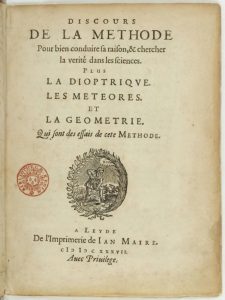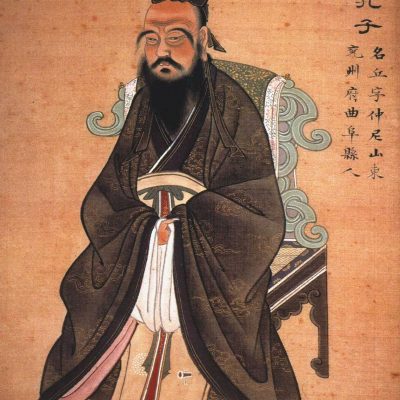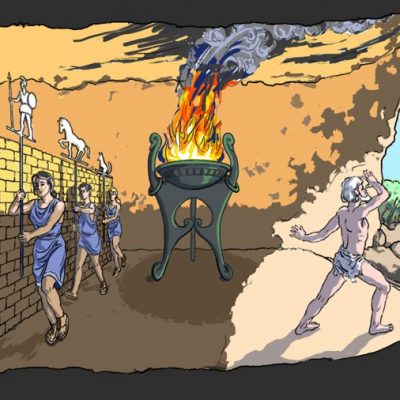 I was then in Germany, where the occasion of the wars, which are not yet finished, had called me; and as I was returning from the coronation of the Emperor to the army, the commencement of the winter stopped me in a quarter where, finding no conversation which amused me, and having, besides, happily, no care nor passions which disturbed me, I remained all day locked up alone in a stove, where I had every leisure to converse with my thoughts. One of the first was that I took it for myself to consider that there is often not so much perfection in works composed of several pieces, and made by the hands of various masters, than in those to which only one worked. Thus we see that the buildings which a single architect has undertaken and completed are usually more beautiful and better ordered than those which many have attempted to mend by making use of old walls which had been constructed for other purposes . Thus these ancient cities, which, having been originally only villages, have become, in succession, times of great cities, are usually so badly compassed, at the price of those regular places which an engineer traces to his imagination in a plain, that, considering their edifices each separately, they often find as much or more art as in those of the others, nevertheless, to see how they are arranged, here a great one, a little one there, and how they render the streets bent and uneven, it would be said that it is rather fortune that the will of some men of reason, who has so disposed them. And if we consider that there have nevertheless been, at all times, some officers who have been in charge of taking care of the ships of individuals, to make them serve for the ornament of the public, it will be well known that it is difficult, working only on the works of others, to do very accomplished things. Thus I imagined that the peoples who, having formerly been half-savage, and having only gradually become civilized, have made their laws only in proportion as the inconvenience of crimes and quarrels constrained, could not be so well policed as those who, from the commencement of their assembly, have observed the constitutions of some prudent legislator. As it is very certain that the state of the true religion, of which God alone has made ordinances, must be incomparably better regulated than all the others. And to speak of human things, I believe that if Sparta was once very flourishing, it was not because of the goodness of each of its laws in particular, since many were very strange, and even contrary to good manners; but because, having been invented by only one, they all tended towards the same end. And so I thought that the sciences of books, at least those whose reasons are only probable, and which have no demonstrations, being composed and gradually enlarged by the opinions of several different persons, are not so near of the truth, than the simple reasonings which a man of common sense can naturally make touching the things which present themselves. And so I thought that because we were all children before we were men, and that we had long to be governed by our appetites and preceptors, which were often contrary to one another, and neither one nor the other, perhaps, advised us not always the best, it is almost impossible that our judgments should be so pure or so solid as they would have been had if we had the full use of our reason as early as our birth, and that we should have been led only by her.
I was then in Germany, where the occasion of the wars, which are not yet finished, had called me; and as I was returning from the coronation of the Emperor to the army, the commencement of the winter stopped me in a quarter where, finding no conversation which amused me, and having, besides, happily, no care nor passions which disturbed me, I remained all day locked up alone in a stove, where I had every leisure to converse with my thoughts. One of the first was that I took it for myself to consider that there is often not so much perfection in works composed of several pieces, and made by the hands of various masters, than in those to which only one worked. Thus we see that the buildings which a single architect has undertaken and completed are usually more beautiful and better ordered than those which many have attempted to mend by making use of old walls which had been constructed for other purposes . Thus these ancient cities, which, having been originally only villages, have become, in succession, times of great cities, are usually so badly compassed, at the price of those regular places which an engineer traces to his imagination in a plain, that, considering their edifices each separately, they often find as much or more art as in those of the others, nevertheless, to see how they are arranged, here a great one, a little one there, and how they render the streets bent and uneven, it would be said that it is rather fortune that the will of some men of reason, who has so disposed them. And if we consider that there have nevertheless been, at all times, some officers who have been in charge of taking care of the ships of individuals, to make them serve for the ornament of the public, it will be well known that it is difficult, working only on the works of others, to do very accomplished things. Thus I imagined that the peoples who, having formerly been half-savage, and having only gradually become civilized, have made their laws only in proportion as the inconvenience of crimes and quarrels constrained, could not be so well policed as those who, from the commencement of their assembly, have observed the constitutions of some prudent legislator. As it is very certain that the state of the true religion, of which God alone has made ordinances, must be incomparably better regulated than all the others. And to speak of human things, I believe that if Sparta was once very flourishing, it was not because of the goodness of each of its laws in particular, since many were very strange, and even contrary to good manners; but because, having been invented by only one, they all tended towards the same end. And so I thought that the sciences of books, at least those whose reasons are only probable, and which have no demonstrations, being composed and gradually enlarged by the opinions of several different persons, are not so near of the truth, than the simple reasonings which a man of common sense can naturally make touching the things which present themselves. And so I thought that because we were all children before we were men, and that we had long to be governed by our appetites and preceptors, which were often contrary to one another, and neither one nor the other, perhaps, advised us not always the best, it is almost impossible that our judgments should be so pure or so solid as they would have been had if we had the full use of our reason as early as our birth, and that we should have been led only by her.
It is true that we do not see at all that all the houses of a town are thrown to the ground for the sole purpose of redoing them in other ways, and rendering the streets more beautiful; but it is evident that many of them have destroyed their own, and rebuilt them, and that even sometimes they are compelled to do so, when they are in danger of falling by themselves, and when the foundations are not very firm. By the example of which I persuaded myself that there would be no real appearance, that a private individual should plan to reform a state, by altering everything from the foundations, and reversing it in order to straighten it out; nor even to reform the body of the sciences, or the order established in the schools to teach them; but that, for all the opinions I had hitherto received in my belief, I couldn’t do better than undertake a good faith to remove them, in order to postpone them later or other better ones, or the same after I adjusted them to the level of reason. And I firmly believed that by this means I should succeed in leading my life much better than if I built only on old foundations, and rest only on the principles which I had persuaded myself in my youth, never examining whether they were true. For though I observed various difficulties in this, they were not, however, without remedy, nor comparable to those which are found in the reformation of the least things affecting the public. These great bodies are too difficult to raise, being slaughtered, or even retaining being shaken, and their falls can only be very rough. Then, for their imperfections, if they have any, as the only diversity which is among them suffices to assure that many have them, the use has undoubtedly softened them, and even it has avoided or imperceptibly corrected quantity, to which such prudence could not be so well served; and, finally, they are almost always more bearable than their change would be; in the same way that the great roads, which revolve between mountains, gradually become so united and so convenient, by dint of being frequented, that it is much better to follow them than to undertake to go straight, climbing over the rocks and descending to the bottom of the precipices.
That is why I can not in any way approve of those turbid and anxious moods, which, being neither called by their birth nor their fortune to the management of public affairs, do not always allow to think of some new reform; and if I thought that there was the least thing in this writing by which I might be suspected of this madness, I should be very sorry to suffer it to be published. Never did my design extend itself more than to try to reform my own thoughts, and to build in a fund which is all mine. If my work has pleased me enough, I will show you the model here, and it is not for this reason that I should advise anyone to imitate it. What God has best shared from his graces may have more elevated designs; but I am afraid that this one is already too bold for many. The only resolution to get rid of all the opinions that have been received before in his mind is not an example that everyone must follow. And the world is composed only of two kinds of minds to which it is not appropriate: namely, those who, thinking themselves more skilful than they are, can not prevent themselves from precipitating their judgments, patience, to command all their thoughts, whence it follows, that if they had once taken the liberty of doubting the principles which they have received, and of departing from the common path, they would never be able to hold the path which must be taken in order to go straight, and remain astray all their lives; then of those who, having sufficient reason or modesty to judge that they are less able to distinguish truth from falsity than some others by which they may be instructed, must rather content themselves with following the opinions of these others, than to seek better ones themselves.
Translated by Nicolae Sfetcu from Discours de la méthode Pour bien conduire sa raison, et chercher la vérité dans les sciences, by René Descartes










Leave a Reply